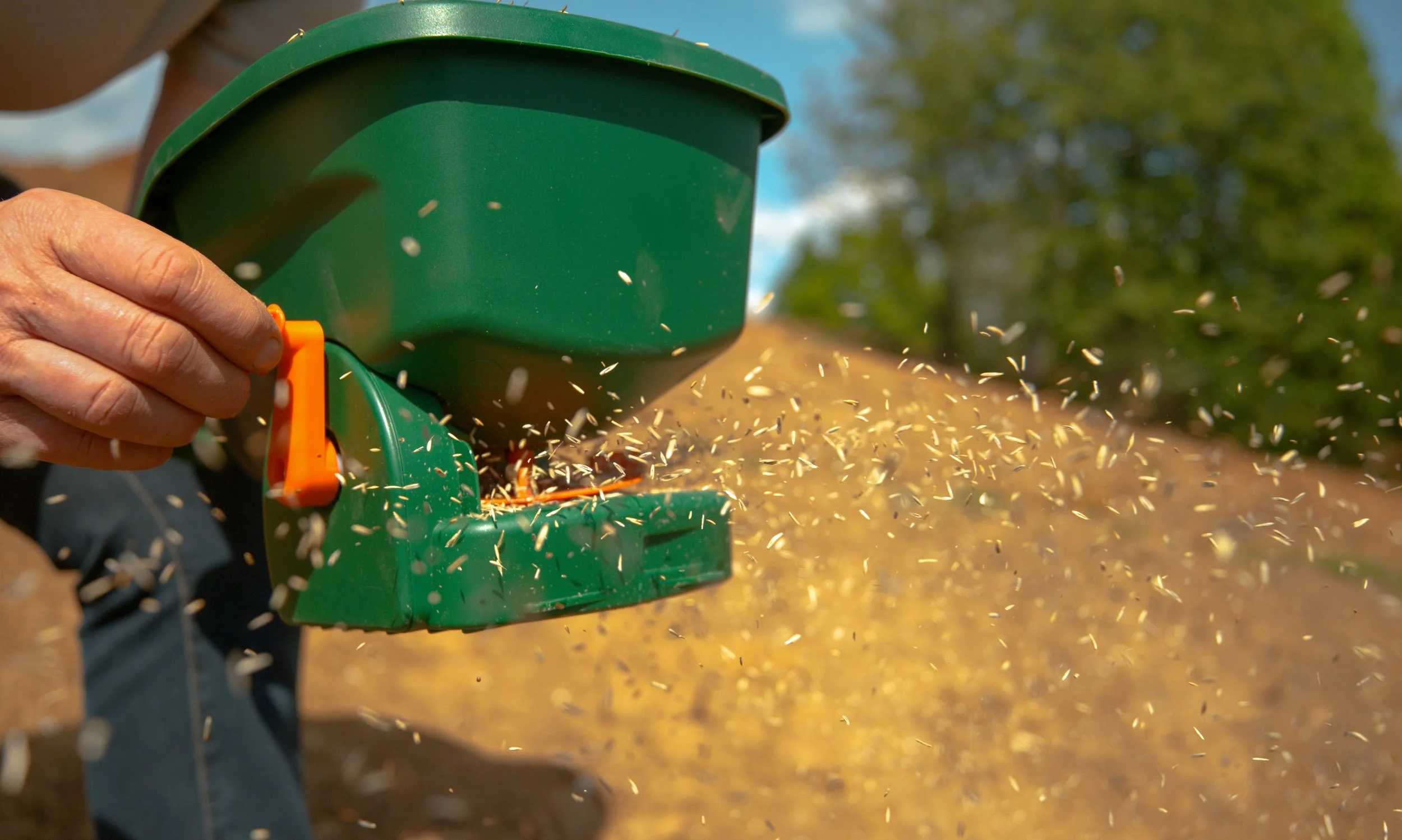Overseeding in Bermuda
You can overseed Bermuda grass with cool-season grasses like perennial ryegrass, but unlike Zoysia, overseeding Bermuda is far more common and generally less risky — provided it’s done correctly.Still, it’s not for everyone. Overseeding Bermuda successfully requires commitment, timing, and more work than leaving the lawn dormant through winter.
This is not for the faint of heart or for homeowners unwilling to invest additional time and money into their lawns. Overseeding Bermuda is an advanced lawn management practice and absolutely WILL REQUIRE “MORE.”
Pros and Cons
Benefits
Green winter color – Bermuda goes fully dormant and brown from late fall through early spring, while ryegrass stays lush and green.
Erosion control – Ryegrass germinates quickly and helps stabilize soil on slopes or bare spots.
Cosmetic appeal – A deep green lawn through the holidays and early spring looks fantastic and can be a great curb-appeal boost.
Drawbacks
Competition – As Bermuda breaks dormancy (typically late April), the ryegrass competes for sunlight, nutrients, and moisture. If not managed properly, this can delay Bermuda’s green-up and weaken your base turf.
More mowing – You’ll be mowing all winter. Ryegrass grows quickly in cool weather and may need mowing every 7–10 days.
More watering – Cool-season grasses don’t tolerate drought well. You’ll need to keep irrigating through winter, which means keeping your irrigation system running longer and reactivating it earlier in spring.
Tip: Use insulated RPZ covers and drain down the system if temperatures drop below freezing.
More work – Overseeding adds several steps to your yearly program. Aeration, scalping, and transitional herbicide applications all become non-optional.
More chemicals – Two factors inherent to overseeding increase the need for chemical intervention.
1) Transition management: In spring (April–May), a blanket post-emergent herbicide application is recommended to remove ryegrass and reduce competition as Bermuda greens up.
2) Disease management: Ryegrass can harbor diseases like gray leaf spot and pythium, especially in mild, wet winters requiring fungicide treatments.
More money – Every “more” above adds cost: extra mowing, watering, chemicals, and fertilizer. Expect a 25–40% increase in annual lawn care cost.
Best Practice (If You Still Want to Try It)
If your goal is to have green color all winter and you’re willing to accept the extra cost and effort, here’s how to do it right:
LET US KNOW: If you plan to overseed, please let us know in advance so we can adjust your program and not apply fall pre-emergent herbicide.
Fall pre-emergent herbicide will STOP all seeds from germinating.
Timing: The Seed should be spread in late September to early October
Seed: We recommend a blend of Rye and Fescue – apply at 10–15 lbs per 1,000 sq. ft.
In some cases, you may need to repeat the seeding process to achieve the desired result.
Mow Bermuda short (1") before seeding to expose the soil.
Aerate before seeding to improve germination.
Fertilize after germination with a balanced starter fertilizer (18-24-12).
Apply a light organic fertilizer (8-2-2) around December to maintain color and vigor.
Water daily until established, then 2–3x per week.
Spring Transition Plan
Come late March–April:
Scalp low (1") to thin out ryegrass and let sunlight hit the Bermuda base.
Stop watering as temperatures rise. This weakens the ryegrass and favors Bermuda’s return.
Apply a post-emergent herbicide to remove remaining ryegrass.
Feed the Bermuda with an application of our “Recovery Blend” fertilizer to speed recovery and transition.
Maintenance Difference
Compared to non-overseeded Bermuda:
More mowing (weekly through winter)
More irrigation through winter/spring
More fertilizer
Additional herbicide application in spring
Possible fungicide treatments for ryegrass diseases
Slightly delayed Bermuda green-up
Alternatives to Overseeding
In Central Arkansas, overseeding Bermuda can be done successfully — but it’s not essential for a healthy lawn. If you prefer low-maintenance simplicity, you could:
Focus on Bermuda health. Use extra funds and energy to increase mowing frequency, sharpen blades, etc.

